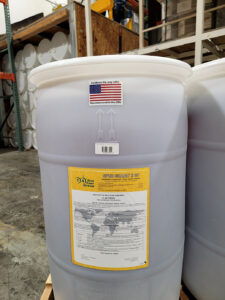Apr 10, 2024Potato storage company relocates chlorpropham manufacturing to US
Potato storage company 1,4GROUP has moved its chlorpropham manufacturing to the United States after the sprout inhibitor was not reauthorized for use in the EU.
Toxicity concerns ended chlorpropham (CIPC) use in 2019 in the EU and the United Kingdom, with sales prohibited from January 2020.
CIPC, registered in the U.S. in 1962, was originally used on a variety of crops to control weeds and grasses, but by 1990, primary registrants had dropped all nationwide uses except for sprout control on postharvest stored potatoes, according to the EPA.

In studies using laboratory animals, CIPC, a mild eye and skin irritant, generally has been shown to be of low acute toxicity. Slightly toxic by the oral route, CIPC has been placed in Toxicity Category III (the second-lowest of four categories), according to the EPA.
The EPA and the Canadian Pest Management Regulatory Agency (PMRA) granted approval for 1,4Group’s new U.S.-based manufacturer, according to a news release from the company. The company declined to specify the location of the manufacturer.
“We at 1,4GROUP are very enthusiastic about the transition,” CEO Steve Elfering said in the release.
 “This will allow us to continue to deliver our quality products (PIN/NIP 98% CIPC and Spud Guard) for sprout control to our valued customers in the North American potato industry. We would like to thank EPA and PMRA for recognizing the quality of our products and the need the potato industry has for them.”
“This will allow us to continue to deliver our quality products (PIN/NIP 98% CIPC and Spud Guard) for sprout control to our valued customers in the North American potato industry. We would like to thank EPA and PMRA for recognizing the quality of our products and the need the potato industry has for them.”
Import tolerance in Japan
Last month, 1,4GROUP secured import tolerance for its 1,4SIGHT storage product in Japan.
The Japanese Ministry for Health, Labor and Welfare updated food residue standards to incorporate a maximum residue level of 15 parts per million for 1,4-DMN (dimethylnaphthalene) in potatoes, according to a news release.
1,4SIGHT works internally to manage sprout and peep control, pressure bruising and shrink, according to the company’s website. The product, which penetrates potato skin to restore dormancy, can be used by itself or as a supplement to CIPC, which works externally.
“The ministry’s assessment concluded that residues of 1,4-DMN in potatoes pose no health concerns,” Jeanette VonKrosigk, Global Regulatory Affairs director at 1,4GROUP, said in the release. “This favorable determination is a significant step forward in enhancing the global trade of potatoes.”
In an email to Spudman, the National Potato Council called the development a “positive development for the industry” that “provides growers an additional tool in their toolbox.”














